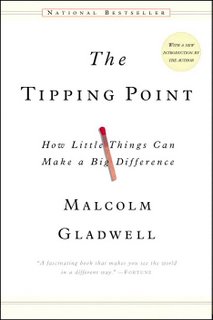Tuesday, October 17, 2006
Karen Carpenter and Perry Como
Here's a video that evokes strong feelings of nostalgia in me when I watch it. I suspect others in my age group might feel the same. I was completely hooked on The Carpenters when I was a teen and I never hear Perry Como that I don't think of Christmas as a child. (He always had a Christmas special on TV.) One of my earliest music memories is my mother singing his song, "Catch A Falling Star" to me as a very young child.
No profound spiritual truth here - just the early morning musings and nostalgic feelings of days gone by. Does this video affect you that way too?
Saturday, October 14, 2006
Bono: In Conversation with Michka Assayas

I was watching Bono on Larry King this week and was impressed with a lot of what he said. Even if you're not a fan of his music, you've surely heard of him. Bono is the lead singer and occasional rhythm guitarist of the Irish rock band U2. In December 2005, he was named by TIME as a Person of the Year, along with Bill and Melinda Gates. He has won a boatload of grammys and even been nominated numerous times for the Nobel Peace Prize.
I find people like Bono interesting and believe they enrich the church. If you want to find fault with the man, it's not that hard. He is transparent - very tranparent. Some Christians have questioned the validity of his faith. While he couldn't be more different from the Christian world I grew up in, there's no doubt in my mind about the sincerity of his faith.
Yeah, I know there are those who will point out his foul language, but honestly, I get just as sick and tired of the language of hyper-churchy, mean-spirited, legalistic types. At least, Bono comes across as "real" to me, unlike some I've heard who speak KJV Elizabethan English with great skill.
Here's an excerpt from the book, Bono: In Conversation with Michka Assayas. I haven't read the book. I found this excerpt on the web.
Assayas: I think I am beginning to understand religion because I have started acting and thinking like a father. What do you make of that?
Bono: Yes, I think that's normal. It's a mind-blowing concept that the God who created the universe might be looking for company, a real relationship with people, but the thing that keeps me on my knees is the difference between Grace and Karma.
Assayas: I haven't heard you talk about that.
Bono: I really believe we've moved out of the realm of Karma into one of Grace.
Assayas: Well, that doesn't make it clearer for me.
Bono: You see, at the center of all religions is the idea of Karma. You know, what you put out comes back to you: an eye for an eye, a tooth for a tooth, or in physics—in physical laws—every action is met by an equal or an opposite one. It's clear to me that Karma is at the very heart of the universe. I'm absolutely sure of it. And yet, along comes this idea called Grace to upend all that "as you reap, so you will sow" stuff. Grace defies reason and logic. Love interrupts, if you like, the consequences of your actions, which in my case is very good news indeed, because I've done a lot of stupid stuff.
Assayas: I'd be interested to hear that.
Bono: That's between me and God. But I'd be in big trouble if Karma was going to finally be my judge. I'd be in deep s---. It doesn't excuse my mistakes, but I'm holding out for Grace. I'm holding out that Jesus took my sins onto the Cross, because I know who I am, and I hope I don't have to depend on my own religiosity.
Assayas: The Son of God who takes away the sins of the world. I wish I could believe in that.
Bono: But I love the idea of the Sacrificial Lamb. I love the idea that God says: Look, you cretins, there are certain results to the way we are, to selfishness, and there's a mortality as part of your very sinful nature, and, let's face it, you're not living a very good life, are you? There are consequences to actions. The point of the death of Christ is that Christ took on the sins of the world, so that what we put out did not come back to us, and that our sinful nature does not reap the obvious death. That's the point. It should keep us humbled… . It's not our own good works that get us through the gates of heaven.
Assayas: That's a great idea, no denying it. Such great hope is wonderful, even though it's close to lunacy, in my view. Christ has his rank among the world's great thinkers. But Son of God, isn't that farfetched?
Bono: No, it's not farfetched to me. Look, the secular response to the Christ story always goes like this: he was a great prophet, obviously a very interesting guy, had a lot to say along the lines of other great prophets, be they Elijah, Muhammad, Buddha, or Confucius. But actually Christ doesn't allow you that. He doesn't let you off that hook. Christ says: No. I'm not saying I'm a teacher, don't call me teacher. I'm not saying I'm a prophet. I'm saying: "I'm the Messiah." I'm saying: "I am God incarnate." And people say: No, no, please, just be a prophet. A prophet, we can take. You're a bit eccentric. We've had John the Baptist eating locusts and wild honey, we can handle that. But don't mention the "M" word! Because, you know, we're gonna have to crucify you. And he goes: No, no. I know you're expecting me to come back with an army, and set you free from these creeps, but actually I am the Messiah. At this point, everyone starts staring at their shoes, and says: Oh, my God, he's gonna keep saying this. So what you're left with is: either Christ was who He said He was—the Messiah—or a complete nutcase. I mean, we're talking nutcase on the level of Charles Manson. This man was like some of the people we've been talking about earlier. This man was strapping himself to a bomb, and had "King of the Jews" on his head, and, as they were putting him up on the Cross, was going: OK, martyrdom, here we go. Bring on the pain! I can take it. I'm not joking here. The idea that the entire course of civilization for over half of the globe could have its fate changed and turned upside-down by a nutcase, for me, that's farfetched …
Bono later says it all comes down to Jesus:
Bono: … When I look at the Cross of Christ, what I see up there is all my s--- and everybody else's. So I ask myself a question a lot of people have asked: Who is this man? And was He who He said He was, or was He just a religious nut? And there it is, and that's the question. And no one can talk you into it or out of it.
His observation on religion:
"Religion can be the enemy of God. It's often what happens when God, like Elvis, has left the building. [laughs] A list of instructions where there was once conviction; dogma where once people just did it; a congregation led by a man where once they were led by the Holy Spirit. Discipline replacing discipleship."
I know little about Bono, but what I have seen and know of him causes me to marvel again at the way our Father uses diffferent types who are different places in our journeys.
Thursday, October 12, 2006
Ministry On Barbados

Melanie and I were on Barbados this week, where I spoke at Barbados Grace Fellowship. (The photo on the left was taken at our hotel.) It was the first time we have visited this beautiful island. The church is only a few years old and the people are excited about the message of grace. Their goal is to be a church that makes the truths our identity in Christ and walking in grace their foundation. The people of Barbados are friendly, warm people.
The congregation began with a few ladies who were excited about learning who they are in Christ. The group grew and finally officially established themselves as a congregation. They meet in a local school. This spoiled American was reminded of how much I value air conditioning since the building there didn't have it. If the old-timers from my childhood were right about sweating when you preach being a sign of "the anointing," it was Pentecost all over again for me.
I believe that this group of people will be a great witness of true grace on their island and may well be a gateway to impacting that part of the Caribbean with the message.
Sunday, October 01, 2006
The Tipping Point
 If you enjoy books that examine the sociological aspects of human nature, you may find The Tipping Point by Malcolm Gladwell to be an interesting book. I finished it on my way back from California this week. The book explores the way that ideas can become contagious until they reach “epidemic level.” Gladwell discusses everything from the success of Paul Revere’s famous ride to the resurgent popularity of Hush Puppies shoes to the phenomenal success of the children’s TV program, Blues Clues.
If you enjoy books that examine the sociological aspects of human nature, you may find The Tipping Point by Malcolm Gladwell to be an interesting book. I finished it on my way back from California this week. The book explores the way that ideas can become contagious until they reach “epidemic level.” Gladwell discusses everything from the success of Paul Revere’s famous ride to the resurgent popularity of Hush Puppies shoes to the phenomenal success of the children’s TV program, Blues Clues.The words "tipping point" comes from the world of epidemiology. It's the name given to that moment in an epidemic when a virus reaches critical mass. It's the boiling point. It's the moment on the graph when the line starts to shoot straight upwards.
Gladwell does a great job analyzing and explaining why certain ideas catch on to the point that they reach critical mass. It caused my mind to start whirring, thinking about how Gladwell’s observations might relate to sharing the message of the grace walk. Since I established Grace Walk Ministries in 1996, there has certainly been a steady increase of interest in the message and I’m thankful for that, but what I pray for is that there will be a sharp, spiked increase among people who are hungry to know the message so that whole denominations, mission agencies and para-church organizations are transformed.
The book isn’t what most would call a “Christian book,” but it is filled with great information that can help Christians. The author calls it “an intellectual adventure story, that draws from psychology, sociology and epidemiology and uses examples from the worlds of business and education and fashion and media.” This type book isn’t everybody’s cup of tea, but if you like books rich in helpful and interesting information, I recommend this one as a good read. After reading it, I find myself praying that the spread of the message of the grace walk will reach the tipping point and that the church of Jesus Christ will begin to live in our full inheritance.